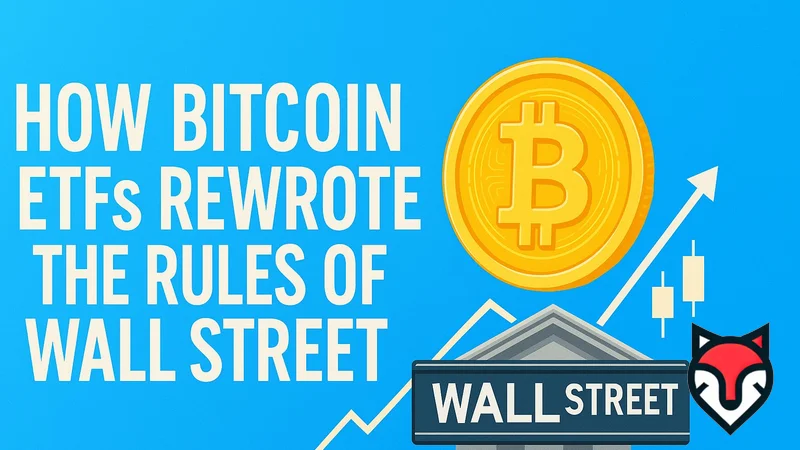Suggested
News
Last updated: Thursday, April 10, 2025

How Bitcoin ETFs Rewrote the Rules of Wall Street
It’s April 10, 2025, and the financial world is buzzing. Bitcoin ETFs—exchange-traded funds tied to the world’s leading cryptocurrency—have stormed Wall Street, flipping the script on how traditional markets operate. Picture this: a Wall Street trader in a crisp suit, once skeptical of digital coins, now tracking Bitcoin ETF tickers like they’re the new gold standard. From New York’s trading floors to your smartphone investing app, Bitcoin ETFs have rewritten the rules, blending crypto’s wild energy with the polished structure of legacy finance. This isn’t just a trend—it’s a seismic shift, and here’s how it’s reshaping Wall Street, one trade at a time.
The Dawn of Bitcoin ETFs: A Game-Changer Unleashed
Bitcoin ETFs didn’t just sneak onto Wall Street—they kicked the door down. Approved by the SEC in January 2024, these funds brought Bitcoin into the mainstream, letting investors buy into the crypto king without wrestling with wallets or exchanges. Think of it: no private keys, no hacking nightmares—just shares trading on the NYSE or Nasdaq. By mid-2025, these ETFs have pulled in over $120 billion in assets, with BlackRock’s iShares Bitcoin Trust (IBIT) alone hitting $55 billion faster than any ETF in history. This isn’t crypto’s fringe anymore; it’s Wall Street’s new darling, and it’s forcing the old guard to adapt or get left behind.
The numbers scream revolution. Bitcoin ETF trading volumes smashed records, with $10 billion changing hands in their first three days—gold ETFs took three years to hit that mark. By April 2025, institutional ownership has quadrupled, jumping from $12 billion to $50 billion in a single quarter. Wall Street titans like Goldman Sachs and Morgan Stanley, once crypto skeptics, are now holding hundreds of millions in Bitcoin ETF shares. The message? Bitcoin’s not a sideshow—it’s rewriting Wall Street’s playbook, and the suits are all in.
Breaking the Old Rules: How Bitcoin ETFs Redefine Investing
Wall Street’s old rules were simple: stocks, bonds, and maybe some commodities if you’re feeling spicy. Bitcoin ETFs tore that rulebook to shreds. These funds track Bitcoin’s spot price, giving investors exposure without the mess of direct ownership. No more cold wallets or shady exchanges—now it’s as easy as buying Apple stock. This simplicity has lured in everyone from hedge funds to retirees, democratizing crypto in a way Satoshi Nakamoto might not have imagined. By 2025, over 70 public companies hold Bitcoin ETFs on their balance sheets, a sign the corporate world’s rewriting its own rules too.
Then there’s the custody shift. Wall Street banks like Citi and State Street, spooked by the SEC’s old SAB 121 rule, stayed out of crypto custody. But with that rule revoked in early 2025 under a pro-crypto Trump administration, these giants jumped in, offering secure, regulated storage for Bitcoin ETF assets. This move slashed concentration risk—90% of ETF assets were once with Coinbase—and brought Wall Street’s heft to crypto’s wild west. The result? A hybrid market where Bitcoin’s rebel spirit meets Wall Street’s ironclad systems, rewriting how trust and security work in finance.

Wall Street’s Power Players: Who’s Leading the Charge?
Who’s steering this ship? BlackRock’s Larry Fink, once a crypto doubter, now calls Bitcoin ETFs “stepping stones to tokenization,” with IBIT leading the pack. Fidelity’s FBTC isn’t far behind, raking in $20 billion in assets by April 2025. These trillion-dollar giants aren’t just playing—they’re rewriting Wall Street’s hierarchy. Smaller players like Bitwise and VanEck slashed fees to 0.2%, sparking a price war that’s making Bitcoin ETFs cheaper than ever. Meanwhile, Grayscale’s GBTC, once the crypto kingpin, struggles to keep up, its 1.5% fees looking like relics in this new era.
Behind the scenes, authorized participants like JPMorgan, Goldman Sachs, and Citadel Securities are greasing the wheels, creating and redeeming ETF shares with precision. This Wall Street muscle has turned Bitcoin ETFs into a liquidity juggernaut, handling millions of trades daily. Add in visionaries like Cathie Wood of Ark Invest, who pushed for ETF approval years ago, and you’ve got a roster of heavy hitters rewriting finance’s future—one Bitcoin at a time.
The Ripple Effect: Wall Street Meets Main Street
Bitcoin ETFs aren’t just Wall Street’s toy—they’re hitting Main Street hard. By 2025, wirehouses like Morgan Stanley and UBS have greenlit these funds for retail clients, unleashing a flood of everyday investors. Your neighbor in Ohio might not know a blockchain from a block party, but they’re buying IBIT shares through their 401(k). This shift’s rewriting who gets to play the investing game—suddenly, crypto’s not just for tech bros in hoodies but for anyone with a brokerage account. Analysts peg retail inflows at $30 billion since launch, dwarfing early expectations.
And it’s not stopping there. Bitcoin ETFs are sparking new strategies—short-selling’s now a thing, letting hedge funds bet against crypto swings right on Wall Street’s turf. Meanwhile, advisors who once scoffed at Bitcoin are pitching it to clients, citing its 2024 outperformance of 495 S&P 500 stocks. The rules of risk and reward? Rewritten. Wall Street’s no longer a gatekeeper—it’s a gateway, and Bitcoin ETFs are the key.
The Regulatory Rewrite: Wall Street’s New Normal
Regulation used to be Bitcoin’s kryptonite—SEC Chair Gary Gensler called it a “speculative, volatile asset” and stalled ETFs for years. But 2025’s a different story. After Gensler’s exit in January, a pro-crypto SEC under Mark Uyeda flipped the script, axing SAB 121 and paving the way for bank custody. This wasn’t just a tweak—it rewrote Wall Street’s relationship with crypto. Now, with Senator Cynthia Lummis pushing the Bitcoin Act to make it a reserve asset, the lines between fiat and digital are blurring faster than ever.
Wall Street’s adapting too. Exchanges like Cboe and Nasdaq, once crypto-agnostic, now list dozens of Bitcoin ETFs, with trading volumes rivaling tech giants. The old guard’s compliance game has morphed—banks aren’t just tolerating crypto; they’re embracing it, rewriting risk management for a digital age. By April 2025, analysts predict DeFi-inspired ETFs could hit $5 trillion, all thanks to Bitcoin ETFs cracking the regulatory dam wide open.
What’s Next: Wall Street’s Bitcoin Future
The rules are rewritten, but the story’s far from over. By year-end 2025, expect Bitcoin ETFs to spark wilder innovations: Ethereum ETFs are already in the pipeline, and tokenized real estate could be next. Analysts like Matt Hougan from Bitwise see wirehouses driving another $50 billion into Bitcoin ETFs, pushing Bitcoin’s price past $100,000. Wall Street’s not just riding this wave—it’s shaping it, with firms like BlackRock eyeing blockchain beyond Bitcoin. Check CoinDesk or Bloomberg—the data’s live and loud.
And the stakes? Massive. If Bitcoin becomes a strategic reserve, Wall Street’s balance sheets could hold trillions in crypto by 2030. The old rules—centralized, slow, exclusive—are dead. Bitcoin ETFs have rewritten Wall Street into a faster, bolder beast, where crypto’s chaos meets finance’s finesse. Searching ‘Bitcoin ETF impact 2025’ or ‘Wall Street crypto trends’? You’re watching history unfold.
Why It Matters to You
This isn’t just Wall Street’s revolution—it’s yours. Bitcoin ETFs have turned a niche crypto dream into a global financial force, rewriting how wealth flows from traders to everyday folks. Whether you’re a Wall Street wolf or a Main Street saver, these funds offer a shot at a market once out of reach. The rules have changed—less gatekeeping, more opportunity. So, how are Bitcoin ETFs rewriting your financial story today? That’s the question worth asking.
Suggested Articles
For You
Related Articles
- Synthetic Assets: Tokenized Derivatives and Top Projects in 2025
- LIBRA Memecoin Scam in Argentina: $110M Freeze Highlights Crypto Investment Risks
- Long-Term vs. Short-Term Investing: Crypto Strategies Unveiled
- Taxation in Crypto: How Major Countries Tax Cryptocurrency in 2025
- Rug Pulls: How to Identify and Avoid Scam Projects in Crypto
- Market Manipulation: Pump-and-Dump Schemes and How to Detect Them
- What If Bitcoin Fails—Who Wins in a Post-BTC World?
- Why Bitcoin’s Strength is Its Biggest Weakness in 2025
- Is Bitcoin Still a Hedge Against Inflation—or Just Hype?
- Can Bitcoin Survive a Cashless America? Exploring Bitcoin Adoption in a Digital Era












